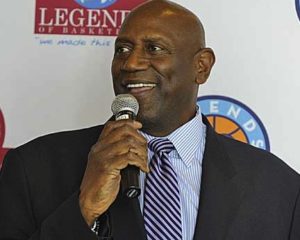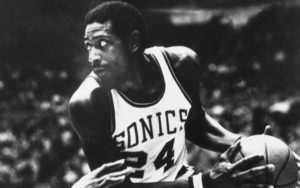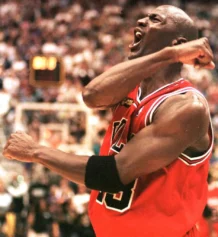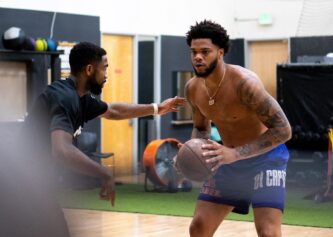
When Haywood was 19 and among the best players in the world, he left the University of Detroit after his sophomore season in 1969 for the ABA Denver Nuggets, the professional league that was an alternative to the NBA. He averaged 30 points and 19.5 rebounds as a rookie, which tells you about the skill set of the 6-foot-9 forward, and then signed with the Seattle Supersonics.
But the NBA blocked the contract because the rule was that players had to have four years out of high school before playing in the league. Haywood stood firm with his convictions and sued, taking the case all the way to the Supreme Court in 1971.
And he won in a landmark decision that eventually led to college underclassmen (and, later, high schoolers) being able to leave college early to join the NBA.
Maybe it would have eventually happened—Spencer Haywood made it happen.
He went on to be a celebrated star player, averaging 20.3 points and 10.3 rebounds over his pro career. He had four NBA all-star appearances. He also, at 19, led the U.S. to the gold medal in the 1968.
But for 27 years, he was denied entry into the hallowed Hall. One never to shy away from sharing his accomplishments or how good he was, Haywood said before the announcement about the two dozen anonymous voters: “They should view my career in a total package. I have the Olympic career. I was the outstanding college player of the year. I won a high school championship. I went to the ABA, was Rookie of the Year, leading scorer, leading rebounder, player of the year and MVP of the All-Star game. I left the game after
14 years with 20 and 10. That’s pretty serious stuff there. I had a great career. And also, I went to the Supreme Court to have Haywood vs. the NBA. That rule has ushered in all of these players. The Jordans, the Magics, the Birds. All the way up to LeBron and Kobe and those guys today.”
He was right, and the voters finally got it right, ushering him to a place deserving of someone who changed the game.
At 65, the former University of Detroit star said he took the courageous step to challenge the NBA when he was not happy with a new coach hired at his college.
“That’s when it first came into my mind that I can’t play (there). I said, what about (other talented players) who were lingering out there?'” Haywood said to nba.com. “They could play but couldn’t maintain the college life. George Gervin had just got kicked out of Eastern Michigan. I decided I’d fight it. I thought it would be a short fight.”
It turned out to be a long fight, but one that impacted college and pro basketball from that moment forward.
“Personally, I thought I was going to be in the Hall 27 years ago,” Haywood said. “But it never happens on Spencer time, and I have to surrender to it being on God’s time, which is really right on time.”
It has been a long journey for Haywood, who grew up picking cotton, battled a cocaine addiction and public marriage and breakup with supermodel Iman.
“My brothers and I, in between doing farm work, we played basketball in our bare feet with a rubber ball and sometimes with a sock,” he said of his upbringing to the Detroit News. “We’d put cotton in a sock and that was our ball. It wouldn’t bounce. You had to do imaginary bounces.
“Basketball was my way out and, sure enough, it has been my way out. I’m just saying, the beauty of the game — that was my reward.”



